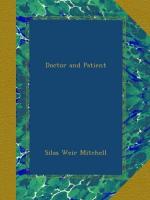There are in novels many good portraits of lawyers, from Pleydell to Tulkinghorn. Whether fair or unjust as pictures, I am scarce able to judge, although I believe that some of them have been recognized by our legal brethren as sufficiently exact. While, however, we have plenty of characters which for his purpose the novelist labels M.D., there seems to have been some insuperable difficulty in evolving for artistic use a doctor who shall seem at home, as such, among the other characters of the novel,—one, at least, who shall appear to any reasonable degree like a doctor to those who really know the genus doctor thoroughly. Save Lydgate, no doctor in fiction answers this critical demand, or seems anything to me but a very stiff lay figure from the moment he is called upon to bring his art into the story, or to figure, except as an unprofessional personage.
Nor does this arise from poverty of types in the tribe of physicians. The training of a doctor’s life produces the most varied effects for good or evil, as may chance, upon the human natures submitted to its discipline, so that I think any thoughtful medical man will tell you that there is a more notable individuality among his brethren in middle life than among most of the people he encounters. As for the novelist’s effort—an inartistic one, it seems to me—to bring on his stage representations of some especial kind of doctor, I have only a grim smile to give, remembering Mr. Reade’s grewsome medico in “Hard Cash,”—a personation meant, I suppose, to present to the public a certain irregular London doctor, but which, to the minds of most physicians, reads like an elaborate advertisement of the man in question.
Sir Bulwer Lytton’s renderings of a homoeopath and a water-cure specialist are open to the same charge, and could only have been successful in the hands of a master.
There are at least two doctors in Balzac’s novels. Rastignac, man of fashion and science, is drawn with the master’s usual skill, but he is not a doctor. His art has no prominence. It is not shown how his peculiarities influenced his work, nor how his art, and its use, altered or modified the man. “The Country Doctor,” by the same strong hand, is far more near my ideal of what this portraiture should be than any other known to me in French literature. The humorous aspects of a medical life in the provinces of France are nicely handled in Jules Sandeau’s “Doctor Herbeau,” but the study, however neat and pleasing, is slight.
Wander where you may, in the drama or the novel, you will still find, I think, that the character of the physician awaits in its interesting varieties competent portrayal.




